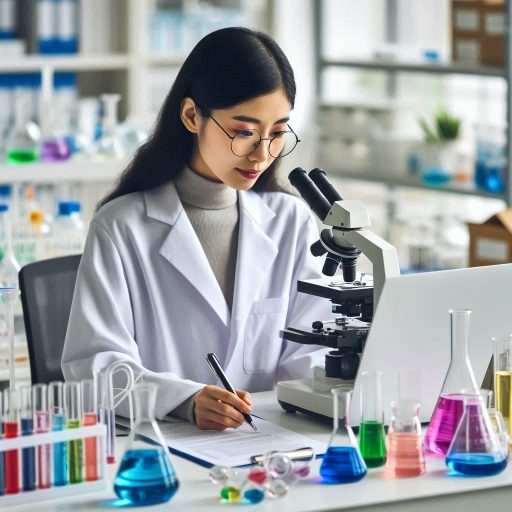Introduction
Marine biotechnology is a specialized field that focuses on the study and application of marine organisms, their genetic material.
Biochemical processes to develop products and processes that benefit human society.
This dynamic area encompasses a wide range of activities, including drug discovery, environmental remediation.
Aquaculture, and the development of sustainable agricultural practices.
By harnessing the unique properties of marine species, marine biotechnology offers innovative solutions to some of the most pressing challenges facing humanity today.
The oceans cover over 70% of our planet and are home to a remarkable diversity of life, including plants, animals, microorganisms, and unique ecosystems.
This vast and largely untapped resource holds immense potential for biotechnological applications.
For example, marine organisms such as sponges, corals, and algae produce a wealth of bioactive compounds with therapeutic properties, making them invaluable in pharmaceutical research.
The study of these organisms can lead to the discovery of new drugs for various ailments, including cancer, inflammation, and infectious diseases.
Marine biologists play a vital role in this field by exploring and understanding the complex ecosystems within our oceans.
Their extensive training and expertise enable them to identify unique marine species and study their biochemical properties, which are often distinct from terrestrial organisms.
Overview of Marine Biologist Role
The Responsibilities of Marine Biologists in Marine Biotechnology
Marine biologists play a vital role in marine biotechnology.
They study organisms in ocean environments and apply their findings to various industries.
Their research contributes to pharmaceuticals, environmental sustainability, and food production.
Marine biologists are responsible for collecting and analyzing marine specimens.
They work on projects that explore genetic resources and biodiversity.
They also monitor the health of marine ecosystems and assess the impacts of human activities.
In addition to research, marine biologists educate the public about marine conservation.
They conduct outreach programs to raise awareness about ocean health.
By sharing their knowledge, they inspire others to protect marine resources.
Marine biologists also contribute to policy-making, providing scientific insights to government agencies and organizations.
Their expertise helps shape regulations that protect marine environments.
The Various Research Methods and Tools They Use
To fulfill their responsibilities, marine biologists employ various research methods.
They utilize field studies to observe marine life in natural habitats.
These studies help them understand species interactions and ecosystem dynamics.
Additionally, they conduct laboratory experiments to investigate specific marine organisms.
These experiments often involve isolating compounds with potential applications.
Marine biologists use advanced technology in their research.
They employ remote sensing tools to collect data about marine environments.
These tools provide information on temperature, salinity, and water quality.
By analyzing this data, they can assess the health of marine ecosystems.
Another essential method is genetic sequencing.
Marine biologists extract DNA from marine organisms to study their genetic makeup.
This technique helps identify unique traits that can lead to biotechnological applications.
For instance, some marine species produce compounds with medicinal properties.
Field sampling is a critical aspect of their work.
Marine biologists collect samples of water, sediment, and organisms.
They analyze these samples to study chemical compositions and biological interactions.
This research is essential for understanding how marine ecosystems function.
Data analysis is crucial in marine biology.
Marine biologists use statistical software to interpret research findings.
They analyze large datasets to identify trends and patterns.
This analysis helps them make informed decisions about conservation and sustainable practices.
Marine biologists often collaborate with other scientists and professionals.
They work with ecologists, chemists, and bioengineers to expand their research.
This interdisciplinary approach fosters innovation in marine biotechnology.
Through collaboration, they can share knowledge and develop new technologies.
Marine biologists play a crucial role in marine biotechnology.
They study marine organisms, employ various research methods, and collaborate with other scientists.
Their work leads to innovative solutions for marine conservation and sustainable practices.
Their contributions significantly impact the health of our oceans and the future of biotechnology.
Read: U.S. Cities with the Most Opportunities for Environmental Scientists
Contribution to Marine Conservation
How Marine Biologists Contribute to the Conservation of Marine Ecosystems
Marine biologists play a crucial role in the conservation of marine ecosystems.
They conduct research that informs management practices and policies aimed at preserving ocean environments.
By studying marine life and habitats, they identify critical areas needing protection.
Marine biologists assess the health of marine ecosystems and monitor changes over time.
This data is vital for implementing effective conservation strategies.
One key area of focus for marine biologists is habitat restoration.
They work on projects to rehabilitate damaged ecosystems, such as coral reefs and mangroves.
By restoring these habitats, they help enhance biodiversity and improve ecosystem resilience.
Marine biologists also promote sustainable practices within fisheries to prevent overfishing.
They advocate for the implementation of regulations that ensure fish populations remain stable.
Additionally, marine biologists engage in public outreach and education.
They raise awareness about the importance of marine conservation among local communities and stakeholders.
By sharing their knowledge, they empower others to take action in protecting marine environments.
Their Role in Protecting Endangered Species and Habitats
Marine biologists also play a critical role in protecting endangered species.
They conduct research to understand the population dynamics and behaviors of vulnerable marine species.
This information helps inform conservation efforts aimed at safeguarding these organisms.
Marine biologists assess threats to endangered species, such as habitat loss and climate change.
They work with policymakers to develop recovery plans and protective measures.
For instance, marine biologists often focus on species like sea turtles, whales, and certain fish populations.
They monitor nesting sites and breeding patterns, providing insights into how to enhance reproductive success.
By studying migratory routes, they identify critical habitats that need protection.
Furthermore, marine biologists collaborate with conservation organizations and government agencies.
They contribute to policy advocacy efforts aimed at establishing marine protected areas (MPAs).
These designated areas provide safe havens for endangered species, allowing populations to recover.
In addition, marine biologists participate in field studies that involve tagging and tracking endangered species.
This research helps gather data on their movements and habitat preferences.
Such information is crucial for understanding the ecological needs of these species.
Overall, marine biologists are essential to marine conservation efforts.
They contribute to the understanding and protection of marine ecosystems and endangered species.
Through research, public engagement, and policy advocacy, they promote sustainable practices and strive to preserve ocean health.
Their dedication helps ensure that future generations can enjoy the richness of marine biodiversity.
Read: Environmental Scientist vs. Ecologist: Roles and Differences in the US
Innovation in Biomedical Research
How Marine Biologists Contribute to Advancements in Medical Research
Marine biologists play a significant role in advancing medical research through their exploration of marine organisms.
Their work often focuses on discovering new compounds with potential therapeutic properties.
By studying diverse marine life, marine biologists uncover biological mechanisms that may lead to innovative medical treatments.
Their research contributes to fields such as pharmacology, cancer research, and neurobiology.
For example, marine biologists study the unique adaptations of marine species to understand disease resistance and healing processes.
These insights can inform the development of new drugs and therapies.
Marine biologists collaborate with pharmaceutical companies and research institutions.
Together, they conduct studies to isolate and test compounds from marine organisms.
This collaboration often leads to breakthroughs in drug discovery, particularly for conditions like cancer and inflammation.
The Discovery of New Compounds and Potential Medical Application
Marine organisms are a rich source of novel bioactive compounds.
Marine biologists have identified numerous substances with potential medical applications, including anti-cancer, anti-inflammatory, and antimicrobial properties.
For example, certain sponges produce compounds that inhibit tumor growth.
These findings have led to the development of new anti-cancer drugs.
In addition, marine algae and corals contain compounds that can be used to create antiviral medications.
Researchers are investigating these organisms for potential treatments against viruses such as HIV and influenza.
Marine biologists are also studying the unique chemical compounds found in deep-sea organisms.
These compounds often exhibit unique properties due to the extreme environments in which these organisms thrive.
Another exciting area of research is the potential use of marine compounds in regenerative medicine.
Some marine organisms have remarkable healing abilities, which may inspire new approaches to tissue repair and regeneration.
For instance, substances derived from sea cucumbers show promise in promoting wound healing and reducing inflammation.
Marine biologists also explore the use of marine organisms in vaccine development.
Research on certain marine species has led to the discovery of novel adjuvants that enhance immune responses.
This innovation could lead to more effective vaccines for various diseases.
Moreover, the field of marine biotechnology is continuously evolving.
Marine biologists actively seek to understand the genetic and biochemical pathways of marine organisms.
This research can lead to the engineering of new compounds with enhanced therapeutic potential.
In summary, marine biologists contribute significantly to innovations in biomedical research.
Their exploration of marine organisms leads to the discovery of new compounds with various medical applications.
Through collaboration and ongoing research, they continue to unlock the potential of the ocean in advancing healthcare.
Their efforts are crucial for developing novel therapies that can improve human health and well-being.
Read: The Relationship Between U.S. Policy & Environmental Scientist Roles
Sustainable Aquaculture Practices
How Marine Biologists Help Improve Aquaculture Practices
Marine biologists play a crucial role in enhancing aquaculture practices.
They conduct research to optimize the cultivation of marine organisms, such as fish, shellfish, and seaweed.
Their studies focus on various aspects of aquaculture, including breeding, feeding, and disease management.
By understanding the biological needs of different species, marine biologists help develop best practices for aquaculture.
They research optimal water quality conditions, such as temperature and salinity, to promote healthy growth.
Additionally, they study the nutritional requirements of aquatic species to improve feeding strategies.
This research helps reduce waste and enhance growth rates, making aquaculture more efficient.
Marine biologists also work to address environmental concerns associated with aquaculture.
They evaluate the impacts of farming practices on surrounding ecosystems.
For example, they study how fish farming affects local water quality and biodiversity.
Through their research, marine biologists can recommend practices that minimize negative environmental impacts.
Furthermore, marine biologists promote the use of sustainable feed sources.
They explore alternative protein sources, such as insects or algae, to reduce reliance on fishmeal.
This shift helps alleviate pressure on wild fish populations, contributing to more sustainable aquaculture practices.
Their Role in Developing Sustainable Food Sources from the Ocean
Marine biologists are at the forefront of developing sustainable food sources from the ocean.
They explore various marine organisms for their potential as food products.
For instance, they investigate the cultivation of seaweed as a nutritious food source.
Seaweed is rich in vitamins and minerals and has a lower environmental impact compared to traditional crops.
In addition to seaweed, marine biologists study shellfish farming.
Shellfish, such as mussels and oysters, require minimal feed input and can thrive in various environments.
They filter water and contribute to improving water quality, making them an environmentally friendly aquaculture option.
Marine biologists also play a vital role in ensuring the sustainability of wild fisheries.
They assess fish stocks and monitor population dynamics to inform management practices.
Their research helps establish quotas and regulations that prevent overfishing and promote the recovery of depleted species.
By supporting sustainable fishing practices, marine biologists contribute to the long-term viability of ocean resources.
Moreover, marine biologists advocate for responsible consumer choices.
They educate the public about the importance of selecting sustainably sourced seafood.
By raising awareness, they encourage consumers to support aquaculture and fisheries that prioritize environmental health.
Innovations in aquaculture technologies also fall under the expertise of marine biologists.
They explore new farming methods, such as recirculating aquaculture systems (RAS) and integrated multi-trophic aquaculture (IMTA).
These methods enhance resource efficiency and minimize environmental impacts.
Marine biologists are essential in improving aquaculture practices and developing sustainable food sources from the ocean.
Their research addresses the challenges facing aquaculture and wild fisheries, contributing to more sustainable food systems.
Through innovation and education, marine biologists help ensure that ocean resources are managed responsibly for future generations.
Transform Your Career Today
Unlock a personalized career strategy that drives real results. Get tailored advice and a roadmap designed just for you.
Start NowRead: Organizations & Associations for Environmental Scientists in the USA

Find Out More: Impact of Hydrology on Agriculture and Irrigation
Biofuel Development
The Contribution of Marine Biologists in the Development of Biofuels
Marine biologists contribute significantly to the development of biofuels by exploring marine organisms as potential sources of renewable energy.
They study algae, seagrasses, and other marine plants for their high lipid content, which can be converted into biodiesel.
Marine biologists conduct research to optimize the cultivation of these organisms, focusing on growth conditions that enhance lipid production.
By investigating the biochemical pathways of marine organisms, marine biologists identify the most effective species for biofuel production.
They analyze the genetic and environmental factors that influence lipid accumulation, aiming to select the most efficient strains.
Additionally, they develop cultivation techniques that maximize biomass yields while minimizing resource use.
Marine biologists also study the processing methods required to convert marine biomass into biofuels.
They explore various extraction and conversion techniques to efficiently produce biofuels from algae and other marine organisms.
This research helps improve the economic viability of marine biofuel production.
Furthermore, marine biologists assess the environmental impacts of biofuel production.
They evaluate how marine biomass harvesting affects local ecosystems and biodiversity.
By understanding these interactions, they can develop guidelines for sustainable harvesting practices.
The Potential of Using Marine Organisms for Renewable Energy Sources
The potential of using marine organisms for renewable energy sources is vast and promising.
Marine algae, in particular, are a key focus due to their rapid growth rates and high productivity.
They can be cultivated in a variety of environments, including coastal areas and open ocean, without competing for arable land.
Algae can be processed to produce biodiesel, bioethanol, and biogas.
These biofuels offer a cleaner alternative to fossil fuels, reducing greenhouse gas emissions.
Additionally, algae can absorb carbon dioxide during growth, contributing to carbon sequestration and helping combat climate change.
Moreover, some marine organisms produce hydrocarbons that can be directly utilized as biofuels.
For example, certain species of microalgae synthesize oils similar to petroleum, which can be refined into diesel or gasoline.
This ability positions marine organisms as potential direct substitutes for traditional fossil fuels.
In addition to algae, seagrasses also hold potential as biofuel sources.
They are highly productive and can be cultivated in coastal regions.
Seagrasses provide additional environmental benefits by stabilizing sediments and enhancing water quality.
The integration of marine biofuel production into existing coastal economies can also create new job opportunities.
Marine biologists collaborate with industries to develop pilot projects that demonstrate the feasibility of marine biofuels.
These collaborations can stimulate innovation and investment in renewable energy technologies.
Marine biologists play a crucial role in biofuel development.
Their research on marine organisms provides valuable insights into optimizing biofuel production and assessing environmental impacts.
The potential for using marine organisms as renewable energy sources is immense, offering a sustainable pathway toward reducing reliance on fossil fuels.
As research advances, marine biofuels could play a significant role in the global transition to cleaner energy solutions.
Discover More: Impact of Climate Change on Seismology Research
Uncover the Details: Funding and Grants for Paleontological Research
You Might Also Like: Volunteer Opportunities for Aspiring Botanists
Challenges and Future Directions
The Challenges Faced by Marine Biologists in Marine Biotechnology
Marine biologists face several challenges in marine biotechnology that hinder research and development.
One major challenge is the limited funding available for marine research.
Compared to terrestrial biology, marine studies often receive less financial support, which restricts the scope and scale of projects.
This limitation can slow down innovation and the discovery of new marine resources.
Another significant challenge is the complexity of marine ecosystems.
Marine environments are diverse and dynamic, making it difficult to study the interactions between species and their habitats.
Understanding these complexities is crucial for developing effective biotechnological applications.
Additionally, the variability of marine organisms, including their genetic diversity, complicates research efforts.
Accessing marine resources can also be challenging.
Marine biologists often require specialized equipment and technology to conduct research in remote or deep-sea locations.
These logistical issues can hinder field studies and limit the collection of valuable data.
Moreover, regulatory hurdles can impede progress in marine biotechnology.
Navigating environmental regulations and permitting processes can be time-consuming and complicated.
These barriers may slow down the development of new products derived from marine organisms.
Lastly, the impact of climate change poses a challenge to marine biodiversity.
Changing ocean temperatures, acidity levels, and other environmental factors can affect the health and distribution of marine species.
This uncertainty complicates the long-term viability of biotechnological applications relying on specific marine resources.
The Future Trends and Opportunities in This Field
Despite these challenges, marine biotechnology holds significant future opportunities.
One promising trend is the growing interest in sustainable practices.
As the demand for environmentally friendly products increases, marine biologists can lead efforts to develop sustainable alternatives derived from marine organisms.
This includes biofuels, natural products, and bioplastics.
Another opportunity lies in the exploration of genetic engineering and synthetic biology.
Advances in these fields allow researchers to manipulate marine organisms at the genetic level.
This could enhance the production of valuable compounds and improve the resilience of marine species to environmental stressors.
The integration of technology in marine research is also expected to grow.
Innovations such as remote sensing, underwater robotics, and artificial intelligence can enhance data collection and analysis.
These tools enable marine biologists to conduct more comprehensive studies of marine ecosystems and accelerate the discovery of new biotechnological applications.
Collaboration among scientists, industries, and policymakers will play a vital role in advancing marine biotechnology.
By fostering partnerships, stakeholders can share knowledge and resources, leading to innovative solutions and improved practices.
Engaging with local communities and involving them in conservation efforts will also be essential for sustainable development.
Finally, public awareness and education about marine biotechnology are crucial.
Increased awareness can lead to greater support for research initiatives and funding opportunities.
Educating the public about the importance of marine biodiversity and its potential applications can foster a culture of conservation and innovation.
While marine biologists face challenges in marine biotechnology, the future is filled with opportunities.
Sustainable practices, genetic engineering, technological advancements, and collaborative efforts can drive innovation in this field.
By overcoming challenges and capitalizing on trends, marine biologists can unlock the vast potential of marine resources for the benefit of society and the environment.
You Might Also Like: Key Research Areas in Climatology Today
Conclusion
Marine biologists play a crucial role in advancing marine biotechnology.
Their expertise helps us understand the complex interactions within marine ecosystems and the vast biodiversity that exists beneath the waves.
By studying marine organisms, they contribute significantly to discovering new species that hold potential for biotechnological applications.
Research by marine biologists leads to the identification of novel compounds with therapeutic properties, paving the way for innovative pharmaceuticals derived from marine resources.
For example, substances from marine sponges and corals have shown promise in treating various diseases, including cancer and bacterial infections.
This highlights how marine biologists drive innovation in the pharmaceutical industry.
Moreover, marine biologists advocate for sustainability by promoting responsible practices in marine resource utilization.
Their research informs policymakers about the importance of maintaining healthy marine habitats, which are crucial for both biodiversity and human well-being.
By establishing guidelines for sustainable practices, marine biologists ensure that marine resources are utilized in a way that does not compromise the health of ecosystems.
Their collaboration with various stakeholders, including industries and governments, enhances the development of sustainable technologies.
Marine biologists work with aquaculture companies to improve practices that minimize environmental impacts while maximizing productivity.
Their expertise is vital in addressing challenges such as overfishing and habitat degradation.
[E-Books for Sale]
The Big Book of 500 High-Paying Jobs in America: Unlock Your Earning Potential
$19.99 • 500 High-Paying Jobs • 330 pages
Explore 500 high-paying jobs in America and learn how to boost your career, earn more, and achieve success!
See All 500 High-Paying Jobs of this E-Book
1001 Professions Without a Degree: High-Paying American Jobs You Can Start Now
$19.99 • 1001 Professions Without a Degree • 174 pages
Discover 1001 high-paying jobs without a degree! Unlock career tips, skills, and success strategies for just $19.99!




